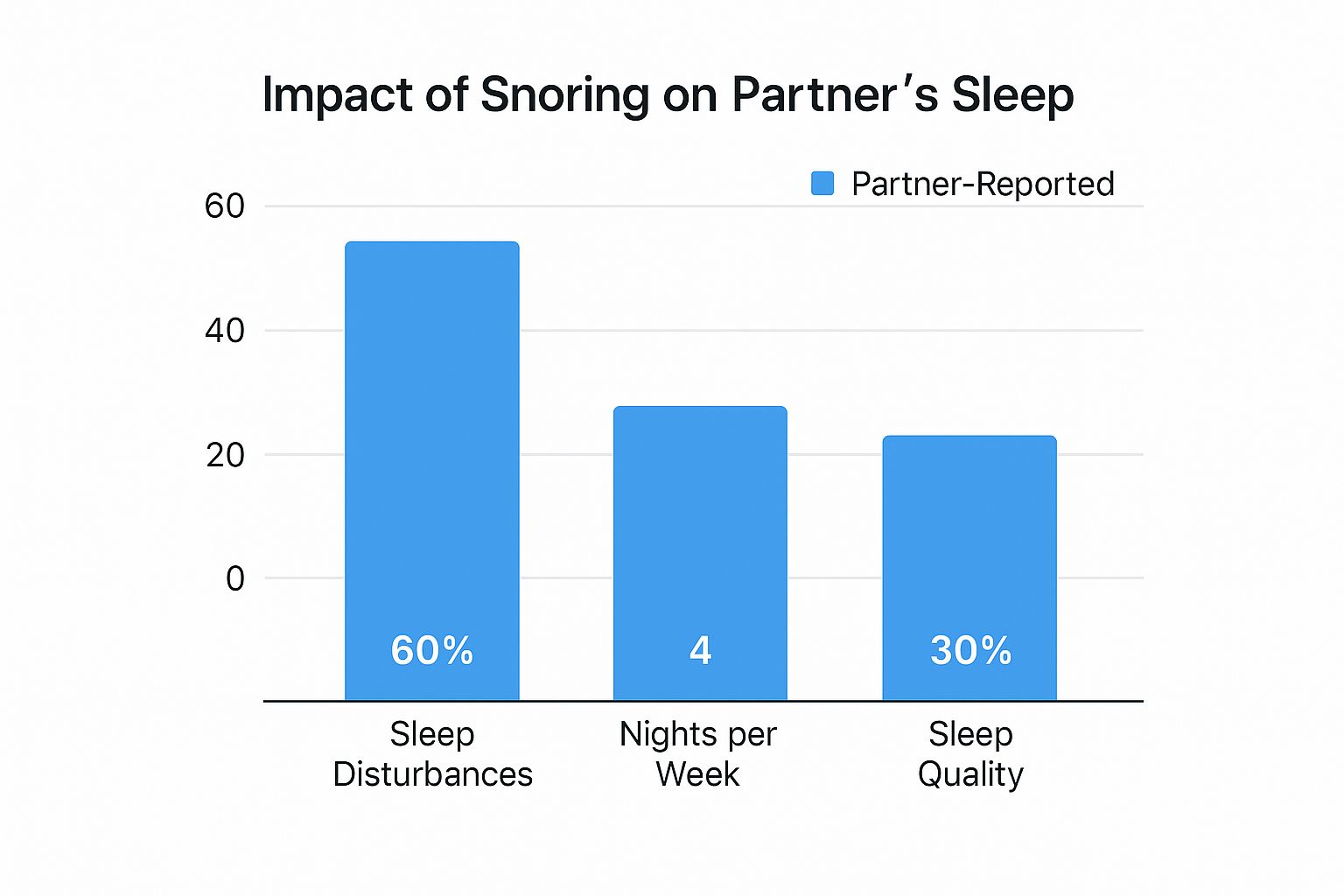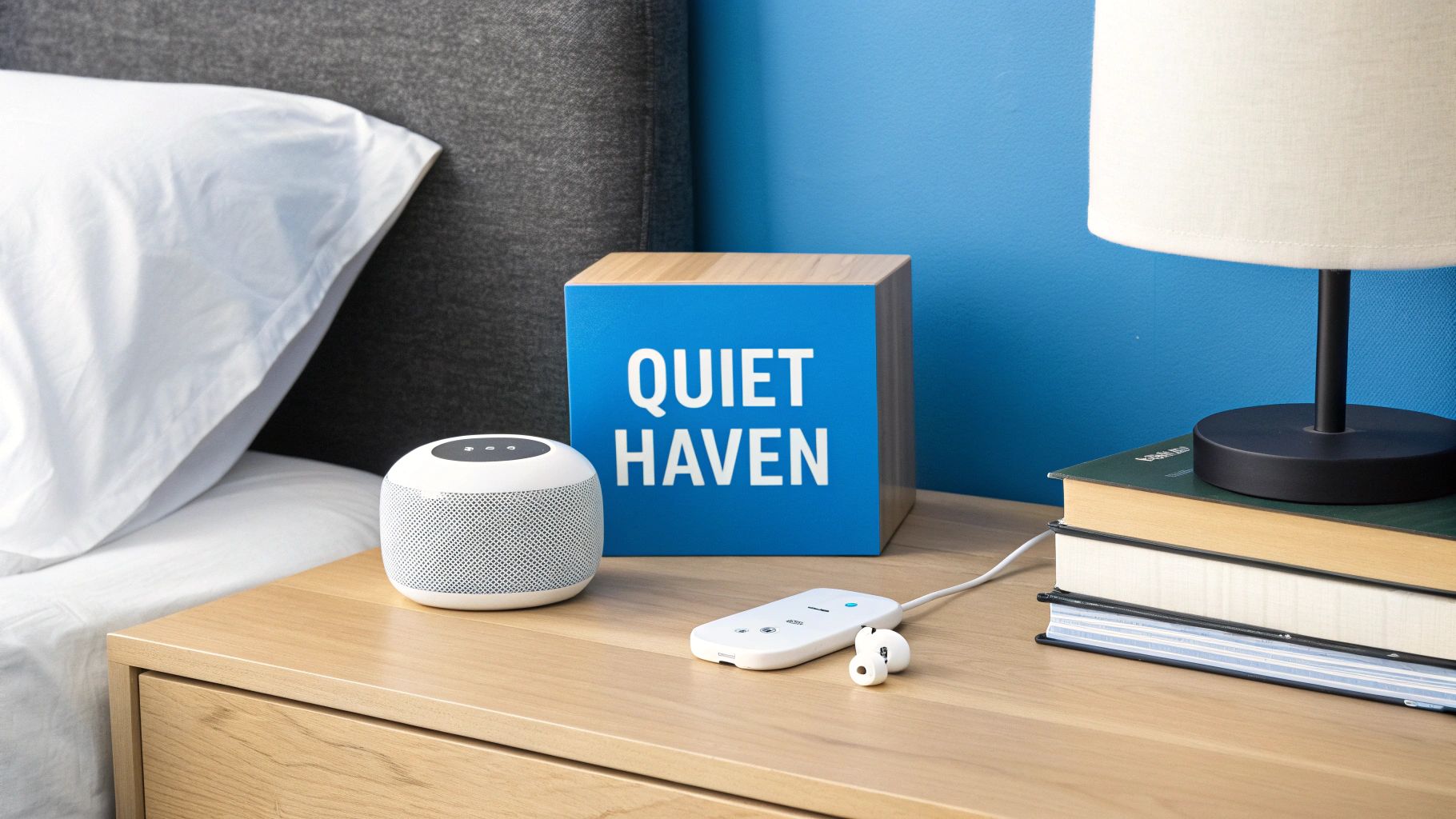When you're lying awake at 3 AM next to a snoring partner, it can feel like you're trapped in a losing battle. It's so much more than just an annoying sound; it's a nightly disruption that chips away at your sleep, your patience, and even the harmony in your relationship.
If you’re constantly sleep-deprived, it's easy for resentment to start brewing under the surface. This isn't just about the noise—it's about feeling exhausted and unheard.
You’re definitely not alone in this. Research shows that up to 57% of people who share a bed with a habitual snorer suffer from poor sleep and daytime fatigue. It gets so bad for some that roughly 20% of couples admit to sleeping in separate rooms just to get some peace.
This guide is your game plan for getting that peace back. The real key is to stop seeing it as a source of conflict and start treating it as a shared goal. We'll walk through:
- Quick Fixes: Practical things you can do tonight to quiet the noise.
- Working Together: How to bring up the issue without pointing fingers and tackle it as a team.
- The "Why": Getting to the bottom of what's causing the snoring, from simple anatomy to potential health issues.
This infographic really puts into perspective just how common and disruptive this problem is for couples everywhere.

As you can see, the data is pretty clear: a huge number of partners are dealing with regular sleep disturbances, which means a major hit to their overall sleep quality.
It's a "We" Problem, Not a "You" Problem
The single most important shift you can make is framing the snoring as a shared problem. Your partner probably has no idea how loud it is or how much it's really affecting you. Those constant interruptions don't just put you in a bad mood; they can have real consequences for your own physical and mental health over time. For a deeper dive, check out our guide on how snoring affects your sleep.
The goal isn’t to win an argument in the middle of the night. It’s to reclaim restful sleep so you both feel healthy, rested, and supported. That whole process has to start with a little empathy and understanding.
Once you move past the frustration, you can start looking at real, effective strategies. This could be anything from simple adjustments in sleeping positions and lifestyle tweaks to creating a true sleep sanctuary in your bedroom—and, of course, knowing when it's time to bring in a doctor.
So, let's get into how you can start this conversation constructively and find solutions that actually work for both of you.
Immediate Actions vs Long-Term Solutions
It helps to think about solutions in two buckets: things you can do right now for immediate relief, and bigger-picture strategies that you and your partner can work on together for a lasting fix. Here’s a quick breakdown to help you see the difference.
| Strategy Type | Examples | Best For |
|---|---|---|
| Immediate Actions | Using earplugs, playing white noise, gently nudging your partner to roll over. | Getting through the night without losing your mind; quick, temporary relief. |
| Long-Term Solutions | Discussing lifestyle changes (diet, exercise), trying anti-snoring devices, seeking a medical diagnosis. | Addressing the root cause of the snoring for a permanent, healthier solution. |
While the immediate fixes are great for your sanity tonight, the real progress comes from tackling this as a team. The long-term solutions are where you'll find lasting peace and better health for both of you.
How to Talk About Snoring Without Starting a Fight

Remember, the goal isn't to win an argument; it's to find a solution that helps you both. Lead with empathy. Make it clear you're worried about their health just as much as your shared well-being.
How to Handle a Defensive Reaction
Even with the most delicate approach, your partner might feel embarrassed, get defensive, or just flat-out deny it. It happens. If you’re met with a wall, the most important thing is to stay calm and not let the conversation escalate.
Acknowledge their feelings right away. You could say something like, “I get that this is probably not easy to hear, and I promise I’m not trying to blame you.” From there, gently bring it back to their health—mentioning that really loud, consistent snoring can sometimes be a red flag for other issues.
Here’s a simple script to get things back on track if they get prickly:
- Acknowledge Their Feelings: "I can see this is upsetting you, and that’s the last thing I want."
- Reiterate Your Concern: "My main worry is that neither of us is getting good rest. I’ve also read that heavy snoring can sometimes be linked to other health stuff."
- Propose a Simple First Step: "What if we just try one small thing, like using an extra pillow, and see if it makes any difference? Or maybe we could just track it for a week?"
By keeping the focus on teamwork and health, you make your partner feel supported, not criticized. This opens the door to actually finding a solution for how to deal with a snoring spouse without it turning into a relationship-damaging fight.
Simple Lifestyle Changes That Actually Reduce Snoring
Before you start looking into high-tech gadgets or more complicated solutions, it’s worth starting with the basics. Sometimes, the most powerful changes are the simplest ones. Many of the triggers for snoring are hiding in plain sight within our daily habits.
When you and your partner work on these together, they become low-cost, high-impact adjustments that can bring surprisingly quick relief.
One of the biggest culprits is often the way your partner sleeps. Sleeping on the back is a classic snore-inducer because it lets gravity pull the tongue and soft tissues backward, which narrows the airway. This is what experts call positional snoring.
And it's not a rare issue—far from it. Studies have found that roughly 50% of snorers have a positional component to their snoring. That’s a huge number, and it means that simply encouraging them to sleep on their side could make a world of difference.
The Power of Positional Therapy
Getting your partner to shift to their side is one of the most effective first moves you can make. It’s a straightforward change that helps keep the airway open and can quiet the noise dramatically. But how do you get them to stay there once they're fast asleep? It takes a bit of strategy.
- Build a Pillow Fort: This sounds playful, but it works. Tucking pillows firmly behind your partner’s back creates a comfortable barrier that makes rolling onto their back a lot harder.
- Try a Specialized Pillow: The market is full of pillows designed specifically to encourage side-sleeping. They often have unique contours that cradle the head and neck, making the side position feel more natural and comfortable.
- Use the Tennis Ball Trick: This one’s an oldie but a goodie for a reason. Attaching a tennis ball to the back of your partner’s pajama top makes lying on their back just uncomfortable enough to make them roll back over to their side without fully waking up.
Team Up on Healthier Habits
Beyond just how they sleep, a few other lifestyle factors can make snoring better or worse. The key here is to frame these changes as a wellness journey you’re on together, rather than a list of demands. When you approach it as a team, it feels like an act of mutual care.
Take alcohol, for example. It's a muscle relaxant, so having a few drinks too close to bedtime can make the throat muscles go extra limp, constricting the airway and dialing up the snores. You could suggest something like, "Hey, let's try having our last drink a few hours before bed and see if it helps us both sleep better." It can be a total game-changer.
Key Takeaway: Small, consistent changes really do add up. By tackling one or two of these habits together, you can not only reduce snoring but also boost your overall health—a true win-win for both of you.
Staying hydrated is another incredibly simple fix. When you're dehydrated, the secretions in your nose and soft palate can get sticky, which contributes to snoring. Just making sure you both drink enough water throughout the day is an easy habit that supports clearer breathing at night. For even more ideas, check out our guide on how to stop snoring naturally.
Finally, don't overlook the bedroom environment itself. Allergens floating in the air—like dust mites, pet dander, or pollen—can cause nasal congestion and inflammation. This often forces mouth-breathing, which is a one-way ticket to Snore City.
To create a more allergen-free zone, try these simple steps:
- Wash Bedding Often: Toss sheets, pillowcases, and blankets in the wash at least once a week using hot water to kill off dust mites.
- Make the Bedroom a Pet-Free Zone: This can be a tough one for pet lovers, but if possible, keeping pets out of the bedroom (or at least off the bed) can significantly cut down on dander.
- Bring in an Air Purifier: A good air purifier with a HEPA filter is great at trapping those tiny airborne allergens, leaving you with cleaner air to breathe all night long.
Creating a Bedroom That Promotes Quiet Sleep

Sometimes, the best defense is a good offense. Your bedroom should be a sanctuary for rest, but persistent snoring can quickly turn it into a place of frustration. By taking control of your surroundings, you can create a space that actively works to minimize disruptions and promote deeper, more peaceful sleep for yourself.
These strategies aren't about fixing your partner’s snoring directly. Instead, they’re about equipping yourself with the tools to manage its impact. Think of it as soundproofing your side of the bed, giving you a buffer against the noise and reclaiming your right to a quiet night.
Mask the Noise and Reclaim Your Peace
One of the most effective ways to deal with a snoring spouse is to fight sound with sound. It’s not the volume of snoring that’s the problem—it’s the jarring, irregular pattern. The sudden loud rumble followed by a quiet moment is what keeps your brain on high alert.
Introducing a consistent, soothing sound can smooth over those peaks and valleys.
A white noise machine is specifically designed for this purpose. It produces a steady hum across all frequencies, effectively masking the snores so your brain doesn't register them as a disruption. If you don't have one, a simple fan often works just as well, providing a constant whir that helps lull you to sleep.
For a more direct approach, finding the right earplugs can be a total game-changer. It’s often a matter of trial and error to find a pair that's comfortable enough for a full night's sleep.
- Foam Earplugs: These are inexpensive and widely available. You just roll them up, insert them, and they expand to fit your ear canal.
- Silicone Putty Earplugs: A great alternative if you hate having things in your ear. These mold to the outside of your ear canal, creating a secure seal.
- Custom-Molded Earplugs: For the best possible fit and sound-blocking, these are made from an impression of your ear. They're pricier, but for many, they're worth it.
If you’re looking for something that combines sound masking with total comfort, it's worth exploring the effectiveness of noise-canceling headphones for sleeping. They can provide an excellent alternative, letting you listen to calming audio without disturbing your partner.
To help you decide, here’s a quick breakdown of the most common sleep aids for the non-snoring partner.
Sleep Aid Comparison for the Non-Snoring Partner
| Sleep Aid | Primary Function | Pros | Cons |
|---|---|---|---|
| White Noise Machine | Masks external sounds with a consistent ambient noise. | Very effective for irregular sounds like snoring. Easy to use. | The sound itself might bother some people. Requires electricity. |
| Foam Earplugs | Physically blocks sound from entering the ear canal. | Inexpensive and widely available. High level of noise reduction. | Can be uncomfortable for side sleepers. May fall out during the night. |
| Silicone Earplugs | Molds to the outer ear to create a noise-blocking seal. | More comfortable for some than foam. Reusable. Good for swimming too. | May not block as much sound as foam earplugs. Can collect lint/hair. |
| Sleep Headphones | Plays audio (music, white noise, podcasts) to mask snoring. | Comfortable headband design. Multi-purpose (sleep, travel, etc.). | Requires charging. More expensive. Sound might still be audible to partner. |
Ultimately, the best choice depends on what you find most comfortable and effective. Many people find success by combining a couple of these options, like using a white noise machine along with a comfortable pair of earplugs.
Optimize the Air and Sleeping Position
The physical environment of your bedroom can also make snoring worse. Dry air, for instance, can irritate the airways and throat, leading to more vibration and louder snoring.
Placing a humidifier in the room adds moisture back into the air, which can help soothe your partner's throat and potentially lessen the noise. For a deeper dive, learning more about improving overall indoor air quality can help reduce other irritants that might be contributing to the problem.
Pro Tip: Elevating the snorer’s head can make an immediate difference. A wedge pillow props up their upper body, using gravity to keep their airway more open and reduce the vibrations that cause snoring.
This small adjustment is a wonderfully non-intrusive way to help manage the noise without waking them. By combining these environmental tweaks, you can build a multi-layered defense system, creating a bedroom that’s finally conducive to quiet, uninterrupted sleep.
When to Suspect It's More Than Just Snoring
Most snoring is just… snoring. A simple vibration of tissues in the throat. But sometimes, that familiar rumble can be a warning sign for something much more serious: Obstructive Sleep Apnea (OSA).
Knowing how to spot the difference isn't just about getting a quiet night's sleep; it’s about protecting your partner's long-term health.
The real clue isn't the volume of the snore, but the pattern. Does the snoring suddenly go quiet, followed by a tense silence? Do they then jolt back to life with a loud gasp, choke, or snort? Those pauses in breathing are the single biggest red flag for sleep apnea.
Beyond the Snoring Sound
The disruption from OSA is so profound that its effects almost always spill over into the daytime. If your partner's snoring is a nightly concert, keep an eye out for these other tell-tale signs that something bigger is at play.
Are they dealing with any of these?
- Severe Daytime Sleepiness: This isn't just feeling a bit tired after a long day. This is an overwhelming urge to sleep that can hit them at their desk, during a conversation, or even while driving.
- Morning Headaches: Waking up with a pounding headache is a classic sign of struggling for oxygen all night.
- Difficulty Concentrating: When sleep quality tanks, the ability to focus, remember things, or stay on task goes with it.
- Irritability or Mood Swings: Constant, deep fatigue would make anyone short-tempered and moody. It's a natural consequence of the body being under so much stress.
If you're nodding along to this list, it's a strong signal that their snoring isn't just an annoyance. It’s a sign their body is fighting for air while they sleep.
Why Taking Action Is So Important
Untreated sleep apnea is not something to brush off. Night after night, it puts an immense strain on the entire body. Over time, this can snowball into serious health problems like high blood pressure, heart disease, and a significantly increased risk of stroke.
Obstructive Sleep Apnea is a massive global health issue, impacting nearly 1 billion adults worldwide. It doesn't just disrupt sleep—untreated cases are linked to huge losses in workplace productivity, costing an estimated $87 billion annually in the U.S. alone. You can read the full research on the global impact of OSA to learn more.
Bringing this up isn't nagging—it's an act of love.
Frame the conversation around their health and how much you care. Something like, “I’ve noticed you sometimes stop breathing in your sleep, and I’m really worried it’s affecting your health,” can open the door. It’s a conversation that could not only bring quiet nights back to your bedroom but also protect their health for years to come.
Common Questions About Dealing With a Snoring Spouse

When you're lying awake listening to what sounds like a freight train next to you, it's only natural to have a million questions running through your mind. What's normal? What actually works? When should I start to worry?
We get it. Here are some straightforward answers to the questions we hear all the time. Our goal is to give you the clarity you need to find your way back to peaceful nights.
Is It Okay to Wake My Partner Up?
Ah, the age-old question. While a gentle nudge to get them to roll over is one thing, constantly waking your partner up is a losing game for both of you. It's a temporary fix that shatters their sleep cycle just as much as their snoring is shattering yours.
Ultimately, this just leads to two tired, grumpy people and can build up some serious resentment over time. A much better strategy is to focus on the proactive solutions you can use before your heads hit the pillow. Tackling the root causes is always more effective than just treating the symptom (the noise!).
How Long Should We Try Home Remedies Before Seeing a Doctor?
Give it a solid, consistent effort for at least a few weeks. If you’ve been diligent with things like changing sleep positions, cutting back on evening alcohol, or using nasal strips and you’re still not hearing any difference, it’s probably time to bring in a professional.
But here’s the important part: if you ever notice your partner gasping, choking, or having pauses in their breathing during the night, don't wait. Those are major red flags that could point to a more serious condition, and you should talk to a doctor right away.
What If My Partner Refuses to Acknowledge the Problem?
This is incredibly common. No one likes to think of themselves as the source of the problem, and snoring can be embarrassing. If your partner gets defensive, you may need to change your approach.
Instead of making it about the noise, frame it as a health and wellness issue for both of you. Try saying something like, "I've been feeling so exhausted lately, and I'm worried you aren't getting deep rest either. I think our sleep is being interrupted."
Sometimes, a little objective evidence helps. You could ask their permission to record the snoring one night. Hearing it for themselves can be a real eye-opener that's hard to ignore. Just remember to lead with teamwork and genuine concern for their health.
Can Snoring Actually Hurt Our Relationship?
Without a doubt, yes. The fallout from snoring goes way beyond the bedroom walls. When you're both chronically sleep-deprived, irritability, mood swings, and a total lack of patience become the new normal.
When one partner feels exhausted and like their needs are being ignored, resentment is quick to follow. Tackling the snoring problem isn't just about getting a quiet night's sleep; it's about protecting your connection. Think of it as an investment in the health of your relationship.
At DubsLabs, we know that a quiet night is the foundation of a healthy life and a happy relationship. If the noise is getting to you, our ultra-thin Bedphones offer a comfortable way to block out sound and get the rest you deserve. Check out our sleep solutions and find your way back to peace at https://www.dubslabs.com.











































